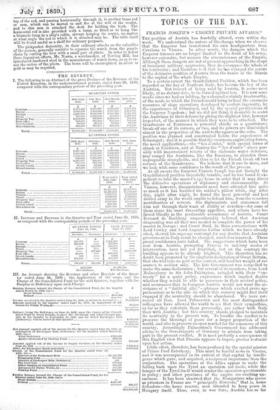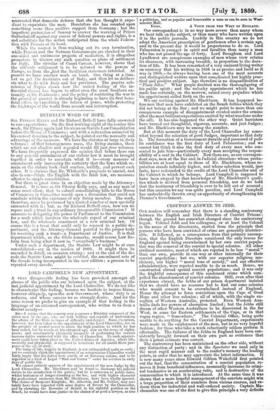TOPICS OF THE DAY.
FRANCIS JOSEPH'S it URGENT PRIVATE AFFAIRS."
THE position of Austria has fearfully altered, even within the week. We understand the nature of the change when we observe that the Emperor has transferred his own headquarters from Cavriana to 'Vienna. In other words, the dangers which the Emperor foresees are no longer limited to the front of his army, however extensive, but menace the circumference of the Empire. Although these dangers are not at present approaching in the shape of imminent military aggression, they do encompass the whole of his territories ; and therefore is it that he has changed the centre of the defensive position of Austria from the banks of the Mind() to the capital of the whole Empire. To a certain extent the Quadrilateral Position, which has been regarded as the key of Northern Italy, has become the key of the Austrian. But instead of being used by Austria, it seems most likely, at no distant date, to be turned against her. It is now some weeks since we had an inkling, by a channel certainly trustworthy, of the mode in which the French would bring to bear the enormous resources of siege operations developed by modern ingenuity, by the experiences of Sebastopol, and by the special predilections of the Emperor Napoleon ; but we did not think it desirable to assist the Austrians in their defence by giving the slightest hint, however imperfect, of the manner in which they were to be attacked. The Quadrature of Fortresses is powerful chiefly as a quadrature; break off one of its corners, or two, and its powers are diminished almost in the proportion of the unit to the square or the cube. The position was planned and constructed before the experiences of Sebastopol; and it is possible that the enormous engineering forces, the novel applications,-the "feu d'enfer," with special forms of attack at Peschiera, and at Mantua the "feu d'enfer " above pos- sibly with inconvenient retorts of the elaborate water defences, may compel the Austrians, like the Russians, to abandon those impregnable strongholds, and thus to let the French break off two corners of the Quadrature. We believe that it can be done, and we look with some confidence to the result of the process.
At all events the Emperor Francis Joseph has not thought the Quadrilateral position imperially tenable, and he has found it ex- pedient to take the master's eye home in order that it may direct the defensive operations of diplomacy and statesmanship. At Vienna, however, disappointment must have attended him quite as much as it has haunted his soldier's pillow while, day after day, night after night, he found the most powerful and best drilled army in the world unable to defend him, from the ceaseless mortification of retreat. His diplomatists and statesmen fail him not through their want of ability or devotion-for some of them share his most fire-eating appetites, and others have be- lieved blindly in the perdurable ascendancy of Austria. Count Bernard de Rechberg unquestionably believed that Austrian dragooning; was all that was needed to complete the power of his master in Europe ; and Count Buol, in those conversations with Lord Cowley and Lord Augustus Loftus which we have already cited, showed his supreme contempt for any doubts that Austrian government in Italy could be changed, much less removed. These proud confidences have failed. The suggestions which have been sent from Austria, prompting Prussia to military modes of intervention, have not yet fructified, but on the contrary the budding appears to be already blighted. This discretion has no doubt been promoted by the emphatic declaration of Great Britain, that she will take no part in the contest, will lend her weight of re- sources to neither side. The Late Government was compelled to make the same declaration ; but several of its members, from Lord Malinesbury to Sir John Pakington, mingled with their " en- treaty " for a quiet policy, expressions which implied doubts whether they would be able to persevere in their neutral policy, and assurances that in Congress Austria would not want the as- sistance of a "faithful ally,"-phrases which excited grave ap- prehensions as to the side on which this country might find itself engaged if the neutrality should be abandoned. We have cor- rected all that. Lord .Palmerston and his most distinguished colleagues have allowed the world to see that their sympathies, so far as they entertain them personally, are rather with Italy than with Austria ; but this country stands pledged to maintain its neutrality in the present war. To localize the conflict is to preserve the blessings of peace for a larger proportion of the
world, and also to preserve an open market for the commerce of this
country. Accordingly Palmerston's Government has addressed advice to the Governments of Germany to abstain from taking part in the present conflict. It is most probably a consequence of this English view that Prussia appears to impose greater restraint upon her action.
Little eflect, therefore, has been produced by the special mission of Prince Paul Esterhazy. This must be fearful news in Vienna, and it was accompanied in its arrival at that capital by intelli- gence which gave, and acquired, a reciprocal importance from the conjunction. The operations of the Allies appear to make the falling back upon the Tyrol an operation not facile, while the
temper of the Tyrol itself would render the operation questionable in policy ; and other provinces of the empire are exciting un- easiness. It has been observed that the Hungarians who arrive as prisoners in France are "principally Honveds," that is, home defenders-the home reserve, men intended to keep peace in Hungary itself. Thus, even. in war time, Austria has so far
mistrusted that domestic defence that she has thought it expe- dient to expatriate the men. Heretofore she has counted upon something more than positive support from Germany ; but the impatient pretension of Saxony to answer the warning of Prince Gortschakoff against any excess of federal powers and rights, is a sad substitute for the action anticipated from the whole Federa- tion with Prussia at its head.
While the contest is thus working out its own termination, while Prussia and the German Governments are checked in their one-sided and untimeous projects of mediation, it is altogether premature to discuss any such question as plans of settlement for Italy. The circular of Count Cavour, however, shows that the ultimate settlement is to be referred to the powers of Europe, as from the first the Sardinian statesman intended. At present we have another work on hand. One thing at a time. Let us get the Austrians out of Italy, and then let us deliber- ate what to do with Italy and her provinces. The passive sub- mission of Naples shows how the united feeling of the in- fluential classes has begun to affect even the most Southern ex- tremity of the Peninsula ; and the policy of restricting the war to the ground of quarrel is already beginning to have its first bene- ficial effect, by expediting the return of peace, while protecting the highways of the world from assault and interruption.



























 Previous page
Previous page